It was twilight as I walked home, feeling a mixture of inspiration and deep unease. Days were shortening. Leaves turning. Temperature falling. The wind had changed. Winter was coming.
I had spent a couple of hours with one of the old folks we adopted during the lockdown. A nice lady aged in her mid-90s. Widowed young. Left to raise her kids the hard way, alone. Those children had long since grown and moved abroad. Now grandparents themselves, rarely seen and seldom heard from.
She lives alone. Hasn’t been outside of her house since March 20th.
Initially from fear of the coronavirus. Unquestioningly following government guidance.
Now out of fear of government guidance and an uncompromising sense of self-preservation.
My neighbour is mentally sharp but physically frail. She is more aware of current affairs and international events than just about anyone I know. A remarkable feat, given she has never used the internet. I don’t have to talk much during these visits, just listen.
She has been reminiscing a lot lately. Reflecting on the life she led. Challenges conquered. Opportunities missed.
Today she seemed over it. Spent. Tired.
On previous visits, she had always made plans for the week ahead. Visitors she was expecting. Cakes she would bake to thank them for stopping by, and to entice them back. Chores she was going to enlist their help with performing.
Guests could not escape with a vague promise to visit her again soon. They were pinned down to a specific date and time. A force to be reckoned with, she wouldn’t have been out of place sitting on a megacorp programme steering board, skewering project managers just for sport!
Today there was none of that.
A heartfelt thank you for keeping her in groceries and looking in on her.
Compliments about the fine young men my sons were becoming.
A jaw-dropping admonishment, delivered bluntly as only old people can, that life was too short for unhappy relationships.
It felt like a goodbye.
To take my mind off the apprehension of what I might find when I next checked in on her, I thought back over one of our recent conversations. My neighbour had lamented that she was been born 50 years early. The world hadn’t been ready for capable women like her.
She had outlined many of the fears and excuses used to hold her generation back. Much the same rhetoric being peddled by populist politicians the world over today. Then she proceeded to destroy every single one of them with facts and figures, highlighting in the process that these arguments weren’t true then any more than they will prove to be true today.
1945
Seventy-five years is not such a long time. Three generations. Still on the fringes of living memory.
Seventy-five years ago the largest armed conflict the world had ever seen was coming to an end.
Cities destroyed.
Economies bankrupted.
An estimated 70,000,000 people dead as a result of the conflict. 3% of the global population.
Germany surrendered in May. Japan followed suit in August.
The losers received show trials and great hardship. Victors got reparations and ticker-tape parades.
By year-end, tens of millions of armed services personnel around the world were slowly being demobilised. A generation of young people trained in killing and destruction returned to civilian life.
All equipped with some combination of medals, the thanks of a grateful nation, and post-traumatic stress disorder.
Some managed to learn a trade during their service. Accounting. Cooking. Engineering. Leadership. Logistics. Medicine. Motor mechanics. Others retained marketable skills from before the war.
Having vast numbers of young men away fighting created a void in many professions back home.
This inconvenience, created by a shortage of able-bodied workers, proved sufficient for employers to look past centuries of prejudice and discrimination. Hiring whomever was capable of doing the job.
Migrants.
Minorities.
Women.
Providing the opportunity of a lifetime for a generation of people who didn’t fit the traditional mould.
After successfully performing those roles for several years, the incumbents suddenly found themselves being displaced by the former occupants, the returning troops.
However, the genie had escaped the bottle. Skills and abilities, once only theoretical due to lack of opportunity, had been undeniably proven. Almost anybody could be taught to perform almost any job.
1970
Fifty years is not such a long time. Two generations. First-hand experiences we can still ask our parents or grandparents about.
Fifty years ago noticeable changes in the fabric of society were taking place. Changes long in the making. Accelerating after the experience of the war years. Building on the foundations that had been constructed over previous decades.
Some countries had begun to pass laws that chipped away at discriminatory hiring practices.
Each advancing some groups. Excluding others.
Single white women. But not married white women.
Married white women. But not pregnant white women.
Pregnant white women. But not minority women.
Minority women. But not disabled women.
Each step representing a small retreat by the orthodoxy. A grudging step in the right direction.
Of course, the beliefs and behaviours underpinning discrimination do not magically vanish at the passing of a law. Such things take time.
Acceptance.
Conditioning.
Education.
But here is the thing: people rarely change their minds about deeply held beliefs.
Instead, those ideas fall out of fashion. Become unpopular. Simmer below the surface.
A vanishingly small number disappear entirely, as those who cling to dated beliefs gradually die out.
The work of generations, not moments.
Change is hard. Disruptive. Scary. Unsettling.
Eliciting change in a reluctant audience is harder still. Apathy, self-interest, and the status quo are strong. Forces of nature.
When power and wealth are viewed as a zero-sum game, improving the chances of some appear to harm the fortune of others. Greater competition for connections, favours, jobs, and wages.
A few see the opportunities offered by an enlarged customer base and pool of potential workers.
Many more do not. Perceiving only the threat to their own existence.
Incumbency endangered.
An innate fear of being on the receiving end of economic and social Darwinism.
Removing the barriers to entry presents a risk that is real, not imagined. The former objects of derision and scorn may one day look down upon them. A tacit acknowledgement that without the assistance of a stacked deck, they may be the “low man” themselves.
Successful change management is a superpower. Rare to the point of being mythical. Someone once likened it to juggling knives whilst riding a unicycle that is on fire. I think that understates things.
The ripples from failing to manage societal changes generations ago can still be observed in every newspaper and news bulletin today. Black Lives Matter. Brexit. Gender pay gap. MAGA. QAnon.
The roots of each lie in the fear of the “other”. “Us” against “them”. What goes up must come down.
1995
Twenty-five years is not such a long time. Within our lifetimes. Personally experienced or observed.
Twenty-five years ago many, but certainly not all, forms of legally enshrined discrimination had been dismantled.
Some remained: Age pension. Affirmative action. Catholic priests. Combat. Hereditary monarchy. Political pre-selection. Single-sex bathrooms, schools, and sports. The right to vote.
The world was certainly not a level playing field. Nor would any but the most naïve have claimed it was a genuine meritocracy. However, the vast majority could at least take their place on the starting line, even if only a very select few stood a realistic chance of winning the race.
Far from perfect. Yet providing the sort of opportunities that our grandmothers would have traded places for in heartbeat.
Women had been elected to the office of Prime Minister in both India and the United Kingdom.
A blind man had been elected to the Commons, and would soon be appointed Home Secretary.
Eventually, a migrant from an ethnic minority would marry into the British royal family. Give birth to a mixed-race son, who would be 7th in line for the throne.
Each would have been unimaginable 75 years ago.
The pace of change has felt glacial to those seeking access to those opportunities that had long been denied them. Yet if we compare the world today to the world my neighbour experienced as a child, things have demonstrably improved.
Too slow.
By not nearly enough.
But progress.
Today
My neighbour told me there had been a popular narrative that as women’s participation rate in the workforce increased, unemployment would surge. It was argued that the economy contained a finite number of jobs, so every job gained by a woman would be at the expense of the man who previously occupied it.
A quick look at the employment statistics disproves the narrative.
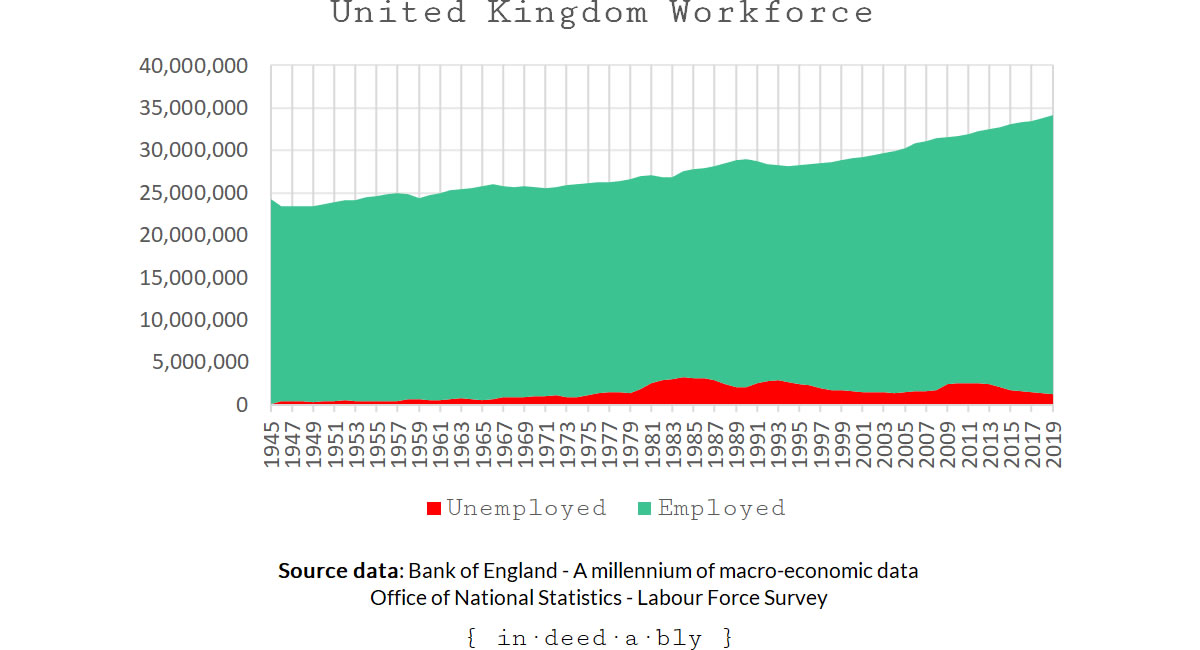
The paid employment rate for women was 34% in the run-up to World War II, while the official unemployment rate coming out of it was little more than rounding error.
By 1970, 50% were in paid employment, while unemployment remained a low 3.75%.
1995 saw 63% of women working. Unemployment had climbed to an uncomfortably high 8.62%.
Today 72% of women are employed in some form of paid work, and at the time of writing the unemployment rate was just 3.9%.
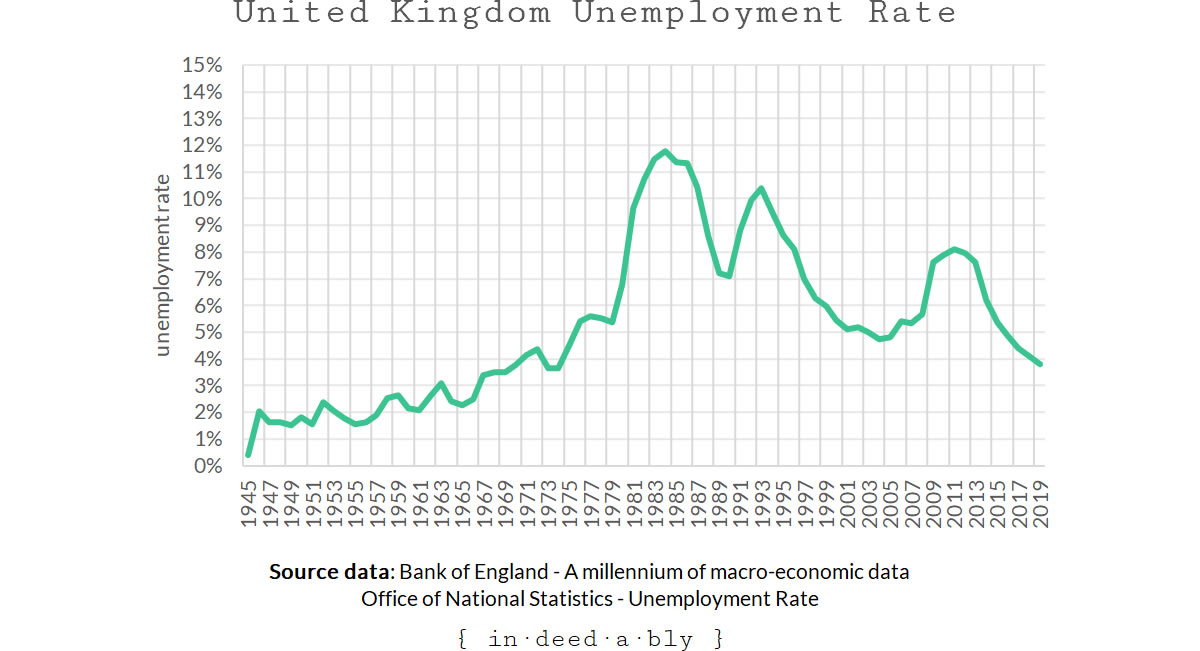
Another argument raised was that if women entered the workforce then wages would fall. The theory went that increasing competition for a finite number of jobs would create a race for the bottom, pricing out the incumbents.
This too proved to be untrue.
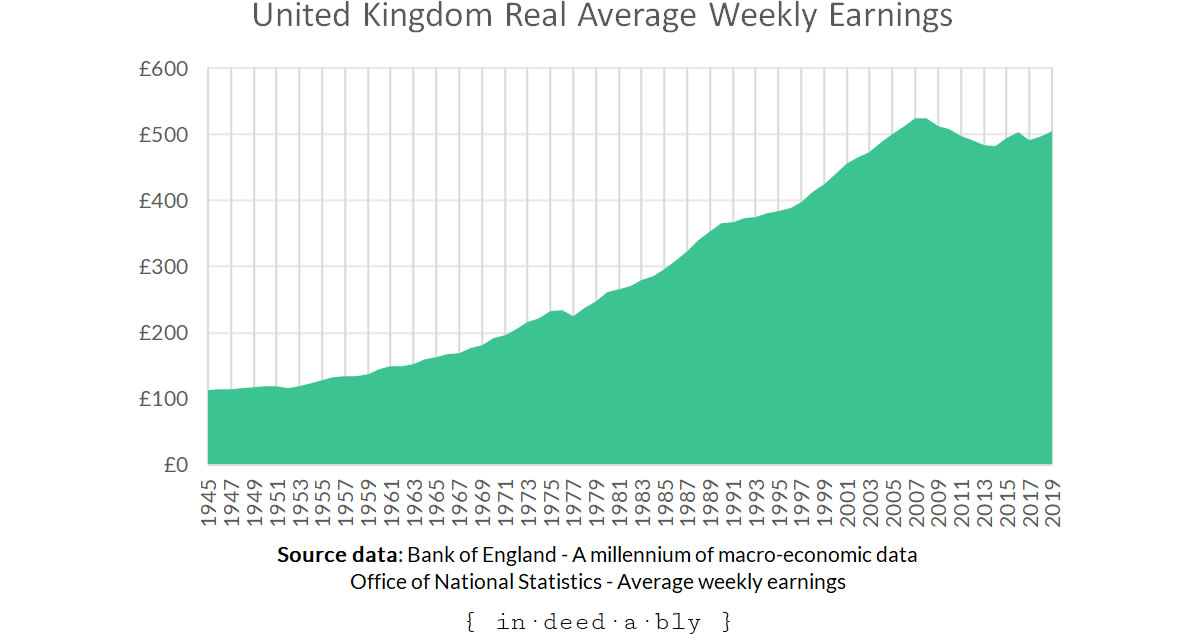
In both cases, these arguments were based on the faulty assumption that the number of jobs was fixed. It isn’t. Instead, the economy expanded to utilise the additional available labour.
Progress wasn’t all rainbows and unicorns. Inevitably, there were knock-on impacts and unexpected consequences. Difficult to spot in the moment. Emerging over the long term, and only in hindsight.
While the economy did absorb the additional number of workers, it could not fully utilise them.
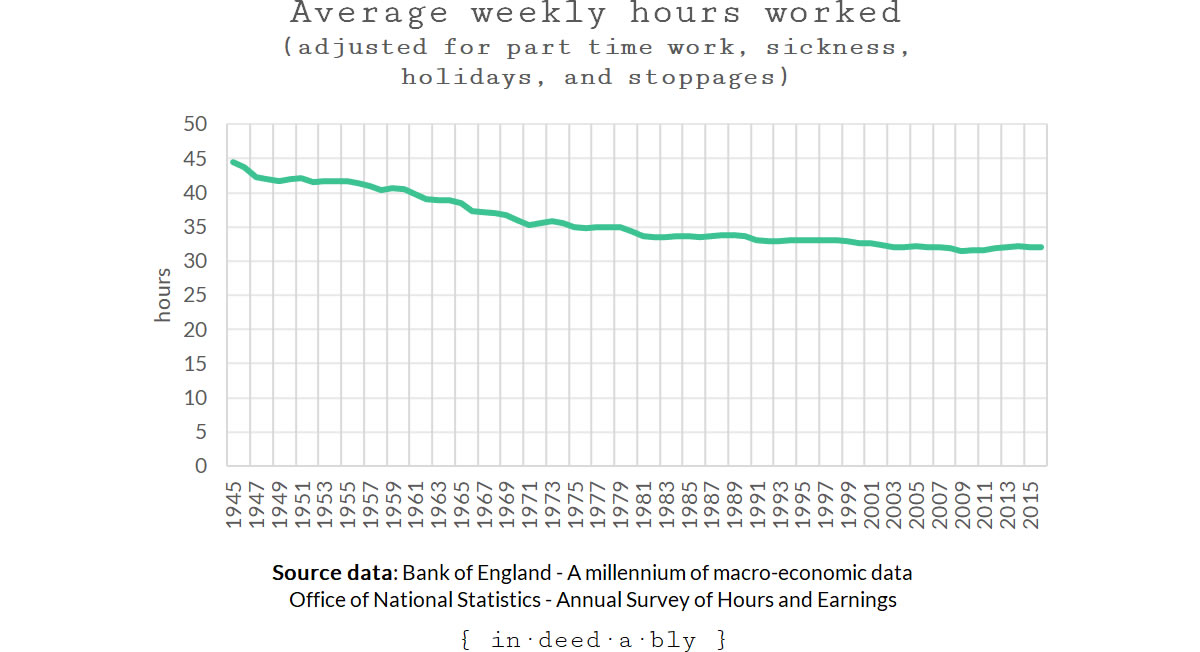
As the participation rate increased, the average number of hours worked declined.
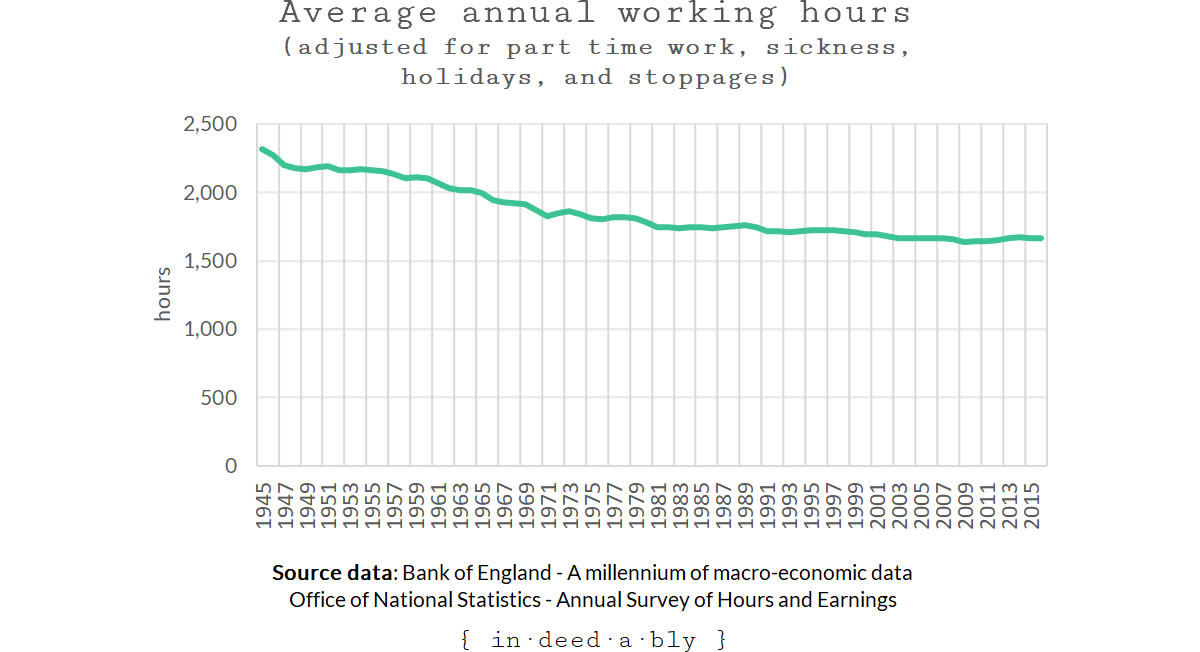
Incurable optimists and financial independence advocates may argue this improved work-life balance.
Realists would more likely conclude that underemployment was becoming an ever-growing problem.
Finally, there was a long-running urban legend that women entering the workforce caused house prices to soar out of the reach of mere mortals. The argument was that property prices were bid up by an ever-increasing number of dual-income households competing over a finite number of houses.
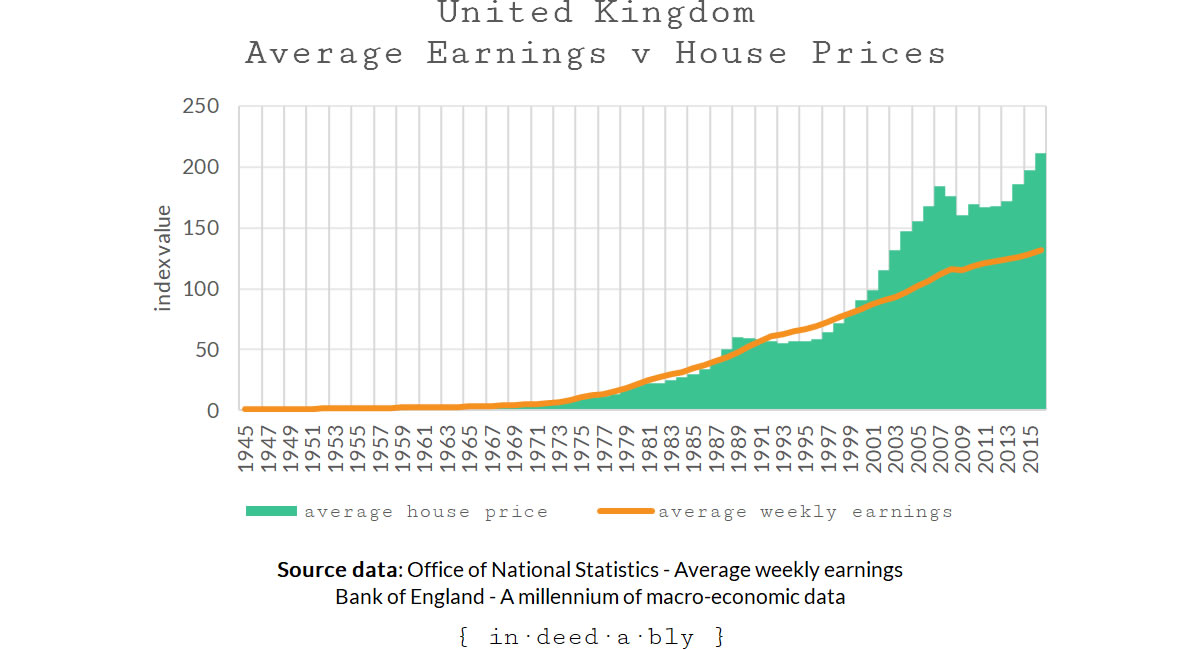
If this were true then house prices should have increased at a much faster rate than earnings throughout the period when the participation rate of women in the paid workforce was rapidly increasing.
Once again the statistics don’t support that assertion. For much of the period in question, earnings grew at a slightly faster rate than property prices. It has only been since the late 1990s, when the majority of women were already in paid employment, that skyrocketing property prices have thoroughly outpaced earnings growth.
50 years early
My elderly neighbour may have been right about being born 50 years too early. She had raised her children while employed as a secretary, working hard but earning little. Like so many in her generation, a lack of education, opportunity, and the glass ceiling limited her advancement.
From the stories she told, it sounded like she had been carrying her boss for decades. The power behind the throne. A puppet master managing via remote control, more than capable of performing the role herself had times been different.
Mandatory retirement saw her put out to pasture long before she was ready to “retire”.
Instead of taking up knitting and meekly shuffling off to the local aged care home, she started a catering business. Spending decades helping people celebrate milestone life events in the company of good friends and family.
Eventually, old age caught up with her. Robbing her of mobility and stamina. She watched with delight as the generations of women and minorities who came after her succeeded in dismantling barriers and began to rule the world.
She firmly believed the fear-mongering and unfounded rhetoric of today will be as thoroughly disproved as the perceived evils of women entering the workforce had been back in her day.
However, she also believed that was only possible in hindsight and by taking a long term view. The daily news was full of noise and gossip, but rarely did anyone revisit the endless prediction and commentary to validate whether the commentator knew what they were talking about or were worth listening to.
Most aren’t.
References
- Bank of England (2016), ‘A millennium of macro-economic data‘
- BBC News (2011), ‘Compulsory retirement age at 65 fully abolished‘
- Bussens, J. (2014), ‘What were the sizes of the forces of each combatant nation in World War II?’, Quora
- Equality and Human Rights Commission (2020), ‘A history of human rights in Britain‘
- Financial Times (2005), ‘Timeline: Career highs and lows of David Blunkett‘
- Hulse, C. (2009), ‘Obama Is Sworn In as the 44th President’, New York Times
- King Jr., M. L. (1963), ‘I have a dream’, YouTube
- Lamont, D. (2020), ‘What 174 years of data tell us about house price affordability in the UK’, Schroders
- National Parks Service (2020), ‘The Civil Rights Act of 1964‘
- Office of National Statistics (2015), ‘Participation rates in the UK – 2014 – 2. Women‘
- Office of National Statistics (2017), ‘Annual percentage of employed women in the UK‘
- Office of National Statistics (2020), ‘Consumer price inflation time series‘
- Office of National Statistics (2020), ‘EARN01: Average weekly earnings‘
- Office of National Statistics (2020), ‘Female employment rate (aged 16 to 64, seasonally adjusted)‘
- Office of National Statistics (2020), ‘Number of People in Employment (aged 16 and over, seasonally adjusted)‘
- Office of National Statistics (2020), ‘Unemployment‘
- Office of National Statistics (2020), ‘Unemployment rateUnemployment rate (aged 16 and over, seasonally adjusted)‘
- Office of National Statistics (2020), ‘X01: Labour Force Survey single-month estimates‘
- Royal UK (2020), ‘Succession‘
- Sawer, M. (2016), ‘The long, slow demise of the “marriage bar”’, Inside Story
- United States Census Bureau (2012), ‘Historical Estimates of World Population‘
- Wikipedia (2020), ‘World War II casualties‘
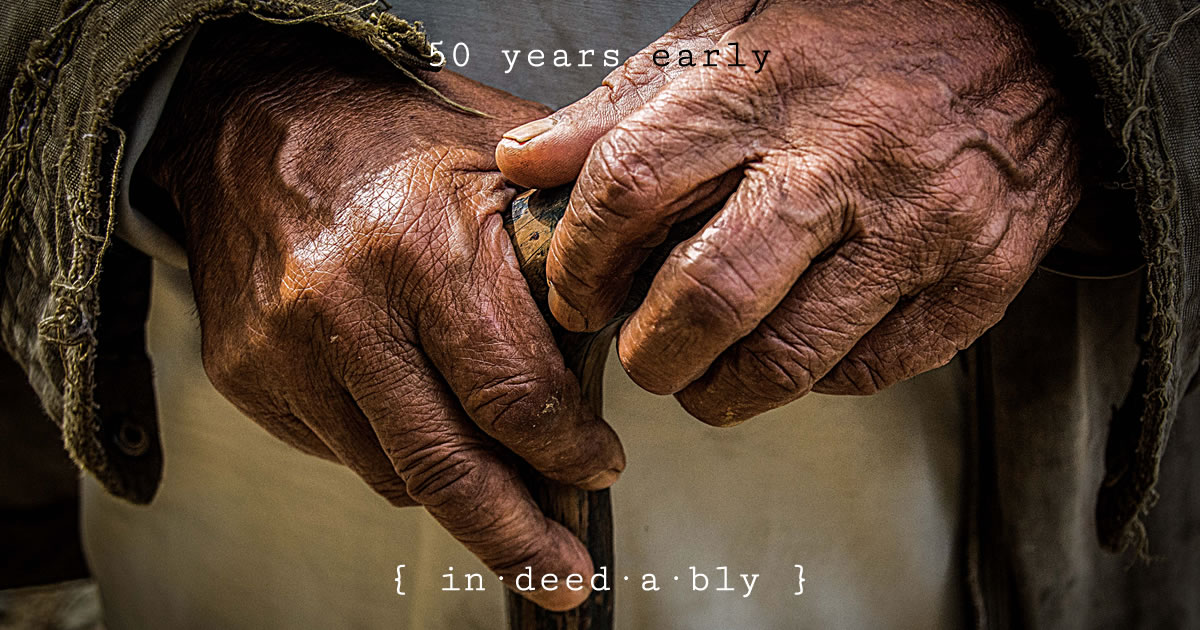

Bow @ Bankeronwheels.com 6 September 2020
It is sometimes depressing to see how long it takes for people to get some basic rights / level playing field. Good to see you adopted someone – unfortunately in the west older people dont get the same respect as what I’ve seen in the East.
sometimes going too fast as a society without taking a step back and reflecting on the bigger picture …
{in·deed·a·bly} 6 September 2020 — Post author
Thanks BoW.
I find it interesting how we get so caught up with “busyness” on low value activities, yet by contrast the pace of important changes can take a lifetime or more.
Many of our elected leaders ably demonstrate with disappointing regularity that wisdom and integrity do not automatically come with age. That said, I find it worth listening to older folks as their experience can offer a valuable perspective, as they have seen much of it before and sometimes know how the story will end.
Bow @ Bankeronwheels.com 6 September 2020
There is also the ego / need to show strength aspect that I didn’t fully consider until I came to Morocco – the way they selected tribe leaders here was also taking into account age for wisdom purposes and to avoid conflicts.
But as you say nowadays wisdom can start at any age – suffice to sign up for a meditation like Vipassana and get some wider perspective on life.
But that’s a longer discussion 🙂 I enjoyed your post!
gettingminted.com 6 September 2020
I think dual incomes did help house prices rise once banks began to apply that. I think the rise since the late ’90’s has been helped by low interest rates.
{in·deed·a·bly} 7 September 2020 — Post author
Thanks GettingMinted.
Housing booms are fuelled by access to credit and taxation treatment. Broadening the basis of the paid workforce did not directly trigger the property price boom.
For example, in the government’s Right to Buy (council tenants acquiring properties at below market prices) and Mortgage Interest Relief At Source (tax deductible mortgage interest) schemes fuelled the boom in the late 80s/early 90s. A similar boom is happening at the moment, with the current government’s stamp duty holiday triggering record high property prices.
Buy-To-Let mortgages were first offered in the United Kingdom in 1996, allowing landlords to base their borrowing applications on the income generated by the property rather than themselves. Again, BTL mortgage interest was tax deductible, making it relatively straightforward to purchase multiple self-financing rental properties. That was a major contributor to the property boom of the late 90s.
Increasing the lending multiple has certainly fanned property prices. Back in the day somebody borrowing at 2.5x earnings was considered to be maxed out. They also faced eye-watering interest rates in the mid-teens.
Today there are lenders willing to go as high as 8x, though the regulators frown on anything over 4.5x. There will be an awful lot of overextended folks when interest rates eventually revert to their historical average.
So you are correct that once lenders began to consider spousal income, the amount they were willing to lend increased, which led to higher house prices. However, the cause was not the broadening of the workforce, but rather the subsequent relaxing of lending criteria several decades later.
No Free Lunch 7 September 2020
What about immigration, surely this would have helped cause the house price inflation, particularly in London, over the last 20-25 years? Immigration levels significantly increased ever since Blair came into power.
As a millennial, I have had to pay a premium for my London home because of this. I understand the benefits of cheap labour, but overall, surely it has been a net negative for people like me buying property say in the last 5 years?
{in·deed·a·bly} 7 September 2020 — Post author
Thanks NoFreeLunch.
Migration tells an interesting story. From the end of the war until the early 1980s, net migration was mostly negative in the United Kingdom (shaded red on the chart below). More people choosing to leave than move here.
Then, in the mid 1990s, that story changed.
Higher levels of positive net migration (shaded light green) have been a consistent feature of the population landscape since then, with the numbers in the 2010s higher again than they had been in the 2000s.
Rising property prices are driven by a combination of two factors.
One is demand, as you observe a high level of positive net migration potentially increases competition and drives up price. As noted above, access to credit and taxation policy will also influence the demand for property.
The other factor is supply. Since the early 2000s, the number of dwelling completions has been outpaced by the organic population growth (i.e. more births than deaths). Obviously households often contain more than one person, but when the population grows faster than the supply of property to house them, this creates scarcity which places upwards pressure on prices.
The housing premium you paid is because you choose to live in London. It is a high cost of living locale, with lots of competition for property. Some of that competition is from migrants, some from organic population growth, some from landlord investors, some from lack of supply, and some from zoning restrictions that keeps population density relatively low.
It is worth noting that in the second half of the 19th century the number of dwellings in the United Kingdom doubled. Throughout this period average property prices fell, as millions of smaller and cheaper properties were thrown up. This would suggest that the supply side of the equation plays a major part in influencing property prices.
No Free Lunch 7 September 2020
Thanks Indeedably. So for the current bull market in housing which started in the 90s, on the demand side we have loosening credit, immigration, tax policy and organic population growth. On the surface it is very difficult to disentangle these drivers to determine what proportion of the price growth was caused by each of the drivers. Further statistical analysis would need to be done at the very least.
I imagine without both inorganic (immigration) and organic population growth, loosening credit and tax policy would not have made much of a difference. It is the confluence of all these drivers that caused the UK housing market, particularly London, to go into overdrive.
I suppose all of these drivers, at least to some extent, are being or will be reversed. Thus would be very interesting on the impact on house prices going forward. London may be a high cost of living due to the supply of its high paying jobs, but I am not sure whether these high paying jobs will remain in terms of numbers in the aftermath of Brexit, COVID and, in the longer term, AI.
And with your point on supply; there seems to have been a lot of new developments and houses converted into flats in London in recent years so I guess another factor to consider in terms of downside risks.
weenie 8 September 2020
A great read, reminds me of my chats with my grandmother. She too is in her mid-90s. Due to her having to leave school early so that she could earn to help feed the family, my gran is barely literate but made up for that by being a natural in basic maths, and had what turned out to be a good mind for business. If not for her illiteracy, she would have been an even more formidable woman!
My own mother, top of her class at school, loved to read and study. But back then, university was pretty much exclusively for young men, so she had no choice but to be married off at 18 and a mother a year later. Between her and my Dad, she was always the one pushing us to go to uni and I didn’t realise until I was an adult that it was because it was what she would have chosen to do but she was never given the choice.
There has been progress in many areas (if only to cite the progress of women in society as an example) but I tend to be of the view that if progress comes too fast, it becomes a case of be careful what you wish for…
{in·deed·a·bly} 8 September 2020 — Post author
Wise words, thanks for sharing weenie.
I tend to agree with you on the pace of change. Not all progress is good progress. Striking down some of the legally enshrined aspects of discrimination were examples of positive progress. Recent events involving Brexit, Hong Kong, Portland, or Xinjiang are all examples of the latter.
Bob 8 September 2020
A well written and thoughtful article. It is nice to know someone who can put a perspective on history because they lived through it. But such muses are rare.
I recall as a young man my father and grandfather still moaning endlessly about the Jacobite Rebellion. That was 250 years before!
{in·deed·a·bly} 9 September 2020 — Post author
Thanks Bob. She was certainly a smart lady, with a gift for identifying cause and effect over the long term. We all live through our own little parts of history, but stepping back and examining why these things happen, then figuring out what comes next is a rare skill indeed.